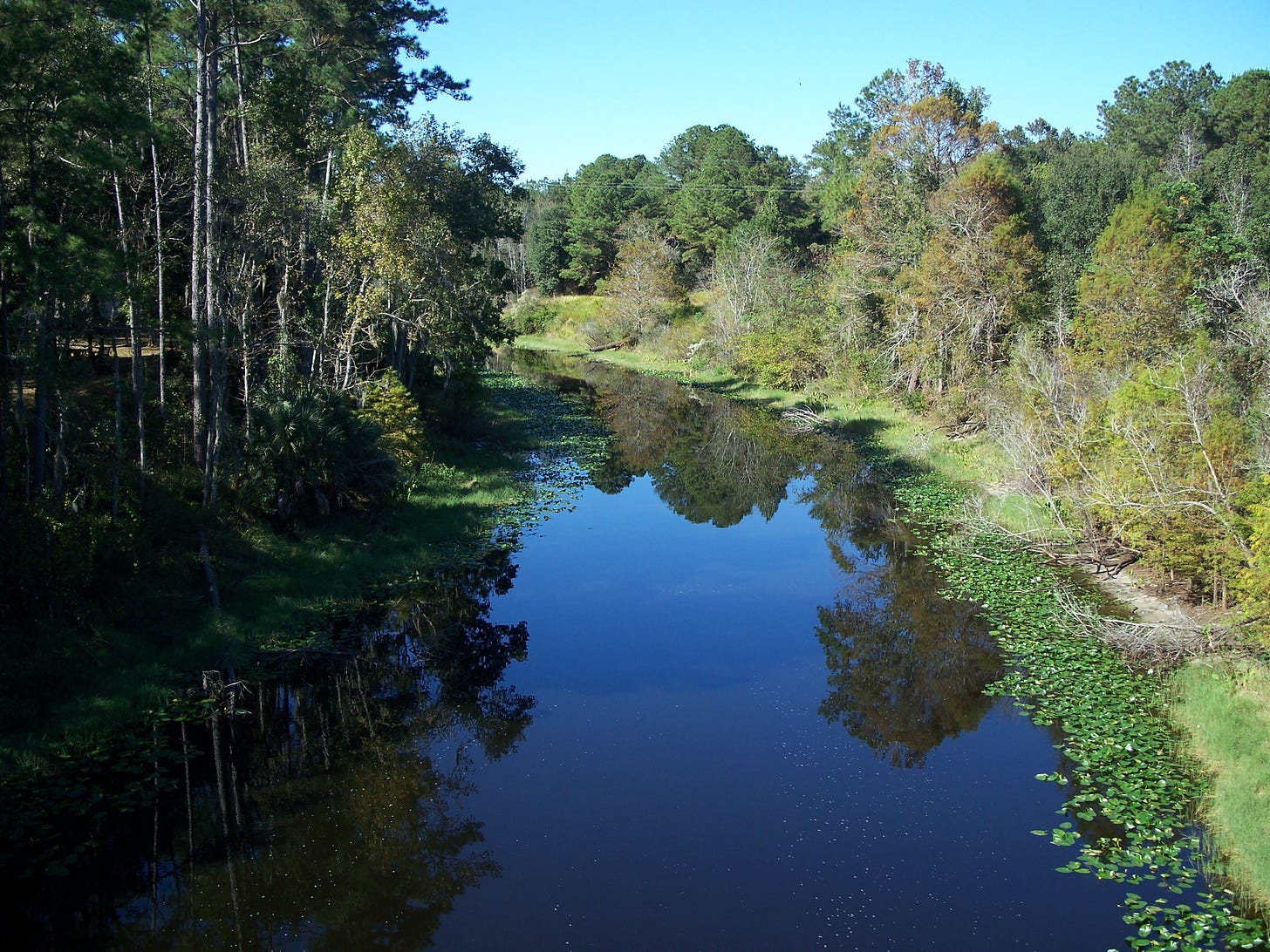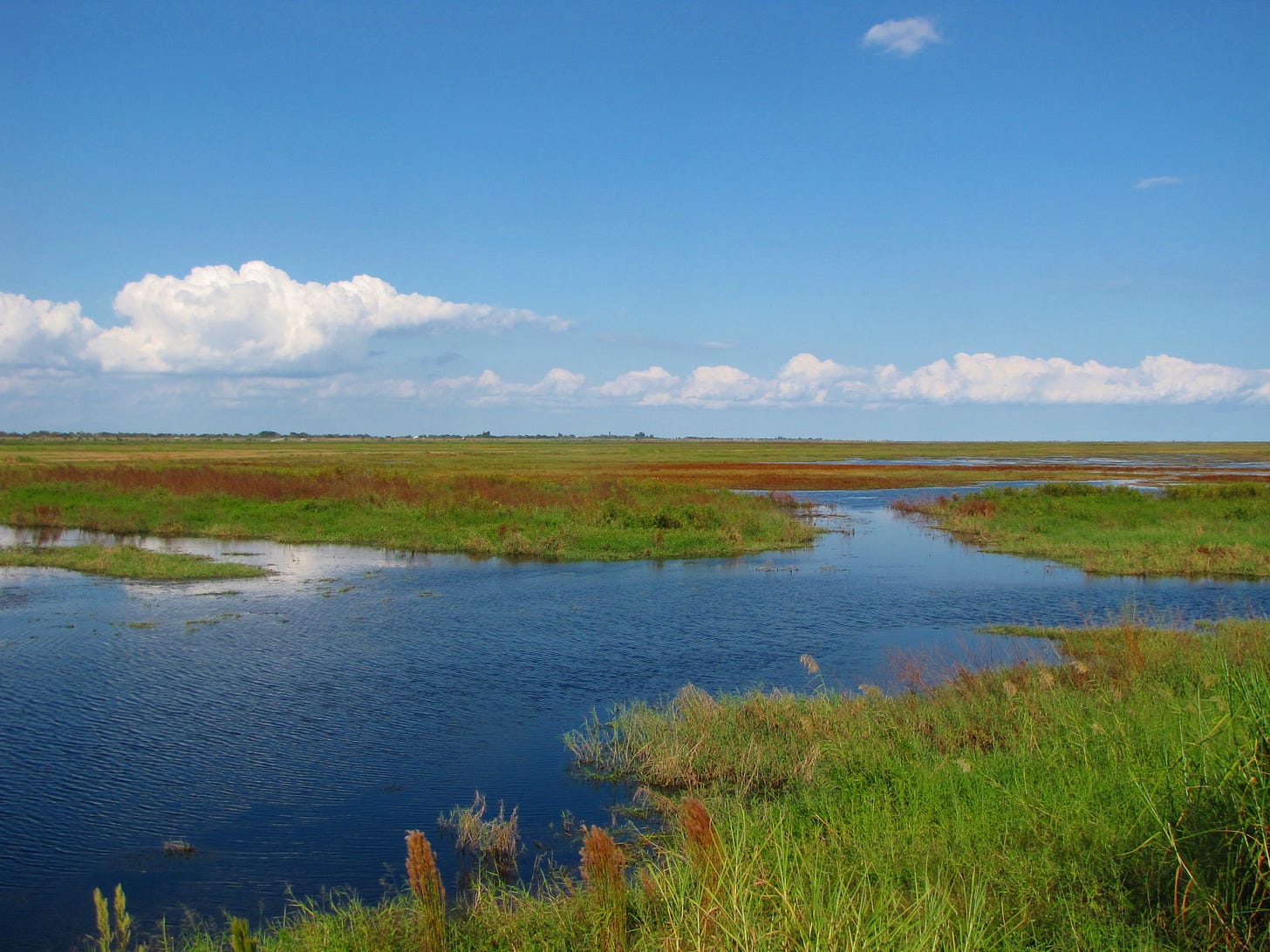Florida's new budget sets the stage for a big environmental battle
A look at some of the interesting stories, intriguing politics, and important policy decisions baked into a $117 billion state budget that Florida lawmakers are about to approve.

This is Seeking Rents, a newsletter and podcast devoted to producing original journalism — and lifting up the journalism of others — that examines the many ways that businesses influence public policy across Florida, written by Jason Garcia. Seeking Rents is free to all. But please consider a voluntary paid subscription, if you can afford one, to help support our work.
About 50 pages deep in Florida’s new state budget, in the midst of a long list of projects and programs to be funded at state universities, there is $500,000 for the University of Florida to prepare a “Science and Economic Report.”
Don’t let the drab description fool you. This could be a big deal.
Because that half a million dollars, records show, could be the seed money that starts the removal of an aging dam in central Florida — and the restoration of a 217-mile river system that runs from Silver Springs to the Atlantic Ocean.
The earmark would fund roughly half a dozen researchers at UF tasked with evaluating the environmental and economic impacts of breaching the Rodman Dam, which was built 66 years ago as part of a never-completed barge canal across the state.
Located about 100 miles north of Orlando, the Rodman Dam blocks the Ocklawaha River and cuts it off from the larger St. Johns River. The dam has for decades been the subject of Florida’s fiercest environmental fight north of the Everglades — pitting naturalists who want to restore the river’s natural flow against local leaders in Putnam County, a little county that has built a big bass-fishing business around the dam and the large lake that it creates.
The funding for this UF study comes amid a renewed effort to restore the Ocklawaha and the larger “Great Riverway” system. Assuming Florida Gov. Ron DeSantis doesn’t veto the money, the university’s research team would be expected to complete their assessment before Florida lawmakers convene for their next legislative session in early 2025 — when dam removal just might be on the agenda.
This is but one example of the many interesting stories, intriguing politics, and important policy decisions baked into Florida’s new $117.5 billion, which the Republican-controlled Florida Legislature will approve on Friday, just before lawmakers gavel the 2024 session to a close.
Here, in no particular order, are a few more:
Lake O water levels
The most intriguing line item in the entire state budget just might be hidden inside a $25 million earmark for the Water School at Florida Gulf Coast University to conduct a “comprehensive water quality study.”
Though it’s not spelled out of in the spending plan itself, some of that money appears ticketed for a study specifically related to Lake Okeechobee, according to budget records and a separate piece of legislation that includes a few more details (Senate Bill 1638).
The study comes while Lake Okeechobee is in the midst of a protracted fight between the sugar industry, Everglades activists, and others about new federal rules for managing lake water levels.

This project is interesting for a few reasons.
First, this study seems likely to delve directly into that debate over water levels. “I believe that’s going to be part of the scope of what they’re going to be working on there,” Rep. James Buchanan (R-Osprey), the sponsor of the House version of SB 1638, said during a committee hearing on the legislation.
Second, this project seems to have been particularly important to the Florida Senate, which pushed to fund the study during budget negotiations. And incoming Senate President Ben Albritton (R-Wauchula) is closely aligned with the state’s agriculture industry.
Third, it appears designed to be veto proof: Even if Florida Gov. Ron DeSantis — a longtime sugar industry antagonist — were to strike that $25 million from the budget, the study would still go forward because it’s also a part of SB 1638. And that’s a tougher bill to veto, because it also contains funding for a wide array of important and popular environmental and resiliency projects.
Much like the Rodman dam study at UF, Senate Bill 1638 requires a report on the Lake Okeechobee study to be delivered to the governor and legislative leadership shortly before the start of next year’s legislative session.
This could be totally benign.
It could also be the start of the next big sugar industry battle in Tallahassee.
A diminished Ron DeSantis
Ron DeSantis wanted $45 million to spend on bonuses for teachers who go through a civics training program developed with help from Hillsdale College, a conservative Christian university in Michigan.
The Florida Legislature will give him $10 million.
DeSantis wanted more than $50 million in new money for the Florida State Guard, the two-year-old state militia he controls.
Lawmakers will give him less than $20 million.
And DeSantis wanted $5 million to continue rounding up migrants at the Texas border and shipping them to liberal locations like Martha’s Vineyard.
But he won’t get any new money at all for his “Unauthorized Alien Transport Program.”
Lawmakers aren’t just giving DeSantis less to spend, either. As the Tampa Bay Times and Miami Herald noted earlier this week, they’re also imposing some new guardrails on the governor.
For instance, lawmakers will continue funding DeSantis’ attempt to turn New College of Florida in an explicitly conservative academic institution. But the school is no longer getting blank checks.
The budget includes detailed instructions about how New College must spend some of its new money — plus requirements that the school start submitting quarterly status reports to the Legislature that better explain how it is using its cash and whether the school is making any measurable academic progress.
There are similar strings attached to funding for the Florida State Guard. The military force will also have to start submitting quarterly status reports to get all its money — and it won’t get the final chunk unless it begins physical construction of a new headquarters in Flagler County…which just happens to be in the district of House Speaker Paul Renner (R-Palm Coast).
Conservative colleges
While the DeSantis allies running the show at New College will have more rules to follow, the Florida Legislature still seems fully on board with the broader push to establish conservative beachheads inside universities around the state.
The budget includes $27 million for the University of Florida’s Hamilton Center to complete renovations of a 93-year-old building on campus that houses the college-within-a-college with a murky origin story. The Hamilton Center will also get an extra $10 million a year for operations.
There’s also $16 million for the Adam Smith Center for Economic Freedom at Florida University, which plays a starring role in a high-profile piece of legislation requiring schools to teach Florida kids the history of communism. And there’s $8 million for the Florida State University Institute for Governance and Civics, which was given a new mission as part of a controversial bill passed last year expanding the state’s infamous “Stop Woke Act.
Lawmakers may even be enlisting private schools in the cause. The higher education portion of the budget includes nearly $2.2 million for St. Thomas University, a private Catholic college in Miami Gardens, to establish an “Institute for Law, Liberty & Capitalism.”
Donors who did well
As it is every year, the state spending plan is dotted with earmarks funding causes near and dear to the heart of some prominent political donors. Among the examples this year:
The Jacksonville Classical Academy will get $6 million to pay for a new, 33,000-square-foot gymnasium. The northeast Florida charter school is led by apartment developer John Rood, one of the state’s largest Republican donors and a guy with influence in the governor’s office.
The Cox Science Center and Aquarium in West Palm Beach will get $5 million to help fund a major expansion and renovation. It’s at least the third consecutive year that Florida lawmakers have lavished money on the museum, whose biggest boosters include venture capitalist Howard Cox — a DeSantis donor who records show has personally lobbied the governor on the museum’s behalf.
The Department of Military Affairs will get $2 million to buy hearing protection equipment to be distributed among members of the national and state guards. Budget forms identity the requestor and the recipient as a Minnesota-based company called Starkey Hearing Technologies — whose founder, William F. “Bill” Austin, is a major donor to both DeSantis and Republicans in the Legislature.
The budget’s lengthy “water projects” list includes $500,000 to buy and plant vegetation in Lake Apopka, the long-suffering lake just northwest of Orlando. The money was requested by a company called Aquaticus Plants, whose partners include John Miklos — a Republican donor whom DeSantis installed on the board that runs the University of Central Florida.
And there’s another $500,000 for a nonprofit called the Figgers Foundation to distribute computer tablets to at-risk youth and seniors. The Figgers Foundation is led by Freddie Figgers, a DeSantis donor and Ethics Commission appointee who nearly landed a no-bid contract from the DeSantis-controlled government that oversees Walt Disney World.
Odds and ends
Job cuts: Ron DeSantis drew headlines around the state when he rolled out a proposed budget that called for cutting roughly 1,000 jobs across the state government. But the final number is much more modest: The budget includes funding for 113,630 positions — 116 fewer than the Legislature’s final budget a year ago.
Culture war costs: It can be hard to cut jobs when you need to hire more people to carry out controversial laws. For instance, the budget includes more than $550,000 to add four positions inside the Agency for Healthcare Administration to carry out data collection requirements under Senate Bill 1718, the anti-immigrant legislation that DeSantis muscled through the Legislature last year, which, among other things, requires hospitals to ask patients about their immigrant status.
Saving a spring: There was an environmental uproar south of Tallahassee last summer when a company tried to build a gas station atop a cave connected to the popular Wakulla Springs. The gas station didn’t go forward, and now it may never: The budget includes just under $3.8 million to buy and preserve the property atop Chip’s Hole cave.
Recovering from a mill closing: One county over from Wakulla Springs, the small city of Perry was rocked last fall when the Koch Industries-owned Georgia Pacific announced it would close a 70-year-old pulp and paper mill that has long been one of the rural region’s main employers. In a small effort to help the community move on, Florida lawmakers will give the local economic-development agency — the Taylor County Industrial Authority — $125,000 to hire extra staff and engage in more job-recruiting.
Keeping bears away (instead of killing them): The Florida Legislature on Thursday passed a bill allowing people to shoot black bears if they feel threatened, an idea pushed by a couple of lawmakers from north Florida who say encounters with bears are rapidly rising in their communities. At least those same lawmakers also got nearly $700,00 into the budget to buy bear-resistant trash cans for residents of rural Franklin County — though it would have been nice if legislative leaders had fully funded this request, which was for nearly $1.4 million, in the same session where they decided to let people shoot bears.
The perks of leadership: One of the biggest earmarks in the budget would provide $80 million to build a beltway in Palm Coast, in the home district of House Speaker Paul Renner. The new road — comprised of three phased projects — would open up 12,000 acres of land to real-estate development about an hour south of Jacksonville.
Beckham scores: The Legislature’s long water projects list also includes $3 million to pay for site work and flood control at Miami Freedom Park — which happens to be the site of an under-construction stadium for the David Beckham-owned Inter Miami professional soccer team. Budget request forms note that the park will include a 25,000-seat stadium for the Major League Soccer franchise best known as the team that currently employs Lionel Messi.
Looking ahead: House Speaker Paul Renner used some of his final blast of budget money — part of what folks in the Capitol call the “sprinkle list” — to help out the Attorney General’s Office, by giving the agency nearly $5.4 million to raise pay for lawyers and legal support staff. Renner, a lawyer, is termed out of the Legislature this year, and the Attorney General job comes open in 2026, when current AG Ashley Moody terms out. Hmmm.
Rapid fire
Let’s end with a little rapid-fire round:
$3,928,467 for the Florida Fish and Wildlife Conservation Commission to buy a new boat to replace the biggest vessel in its fleet: The 85-foot-long — but 56-year-old — Gulf Sentry.
$12 million for the Florida State Fair to install a new air conditioning system
$2.5 million for the Department of Corrections to outsource entrance and exit security at some of its most chronically understaffed prisons
$500,000 for the Public Employee Relations Commission, a defendant in a lawsuit challenging a union-busting law the Legislature passed last year, to hire outside lawyers to help with litigation and rulemaking.
$80 million for the Department of Agriculture and Consumer Services to build a new headquarters in Tallahassee.
$319,260 for the Department of Revenue to spend defending a series of lawsuits filed by a large short-line railroad operator challenging its property tax bills.





OH MY GOD! This is crazy that the amount of money being spent on Hillsdale could go for more meaningful people programs . However, the Republicans in Florida are not in it for the people rather the donors (see Jason's list). Disgusting! I am getting a headache just typing this up! I wonder if the Florida voters who have elected Republicans realize they are being screwed on a daily basis?
Totally disagree with how these monies are being doled out, but we have no say in it. The patronage and the rolling over to DeathSantis causes is disgusting. So much could be accomplished towards homelessness, medicaid expansion, and so many other vital to life priorities, rather than the wastefulness of his private army, teaching communism, and all of the other programs. I guess we have to like the small guardrails in quarterly reports and accomplishments, but we shall see whether they are enforced. As always, thanks for rounding it up in succinct fashion.